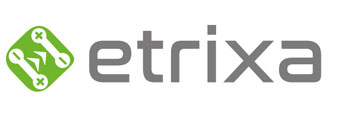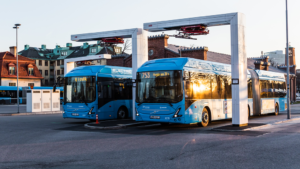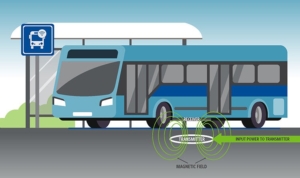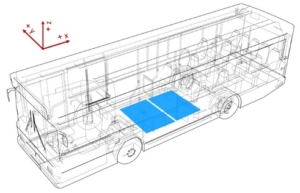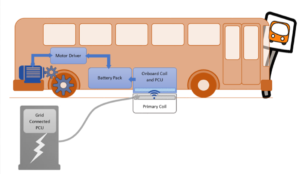Transforming Public Transport with WPT for Electric Buses
——The Future of Clean, Efficient, and Sustainable Urban Mobility
The Shift Toward Sustainable Urban Mobility
Electric buses are reshaping the future of public transportation by reducing emissions, improving air quality, and offering quieter operations. However, the challenges of maintaining continuous operation on long routes require efficient and reliable charging solutions. Wireless charging technology for electric buses offers an innovative solution, providing convenient, on-the-go charging that ensures vehicles are always ready for the next trip without requiring lengthy stops.
The integration of wireless charging into public transit systems is a critical step toward achieving a fully sustainable and connected city infrastructure.
Challenges of Traditional Charging for Electric Buses
- Long Charging Downtime: Wired charging typically requires buses to remain stationary for extended periods, limiting fleet availability and reducing operational efficiency.
- Charging Infrastructure: The need for specialized charging stations along bus routes can be expensive and logistically challenging in densely populated urban areas.
- Space and Congestion: Charging stations can occupy valuable space in bus depots or on city streets, creating congestion and limiting service frequency.
- Weather Sensitivity: External chargers and cables are vulnerable to weather conditions, including rain and snow, which can lead to potential safety hazards.
Why Choose Wireless Charging for Electric Buses?
- Continuous Charging: Wireless charging allows for opportunistic charging, such as while the bus is waiting at a stop or during brief pauses in service.
- Optimized Fleet Operations: Wireless charging systems reduce the need for long charging intervals, ensuring that buses can stay in operation for longer periods and maximize route coverage.
- Space Efficiency: Eliminates the need for bulky charging stations, freeing up space for other infrastructure in urban areas.
- Seamless User Experience: Passengers enjoy a more reliable service as the buses can charge while performing their daily routes without requiring additional downtime.
- Eco-friendly: Contributes to cleaner cities by reducing energy consumption and eliminating the need for additional cables and connectors.
Our Innovative Wireless Charging Solutions for Electric Buses
We provide cutting-edge wireless charging systems tailored specifically for electric buses, designed for high-efficiency power transfer and long-lasting performance. Our solutions are integrated seamlessly into the existing infrastructure of public transport systems, providing cost-effective and scalable solutions.
- High-Speed Charging: Optimized for quick, efficient power transfer to ensure buses are ready for the next route.
- Modular & Scalable: Easily scalable to accommodate the growing needs of urban transit systems.
- Durable & Weatherproof: Built to withstand harsh outdoor environments and various weather conditions.
- Smart Charging: Advanced charging algorithms that ensure optimal energy usage and battery life.
Wireless power transfer technologies (IPT) have been proposed as a potentially superior method of charging electric buses. The advantages of inductive charging over traditional conductive chargers can be summarised to lower maintenance costs due to higher durability, as they are complete solid state solutions compared to moving parts of the overhead chargers, their lower risk of hazards due to no exposed high voltage contacts and their better weather tolerance. In addition, depending on the IPT-System design, charging power can be maximised by requiring less parking time for the driver to faster begin charging with sufficient misalignment tolerance. Furthermore, a more aesthetic and less space consuming integration into the city infrastructure can be achieved by installing inductive chargers under the road in comparison to overhead system.
